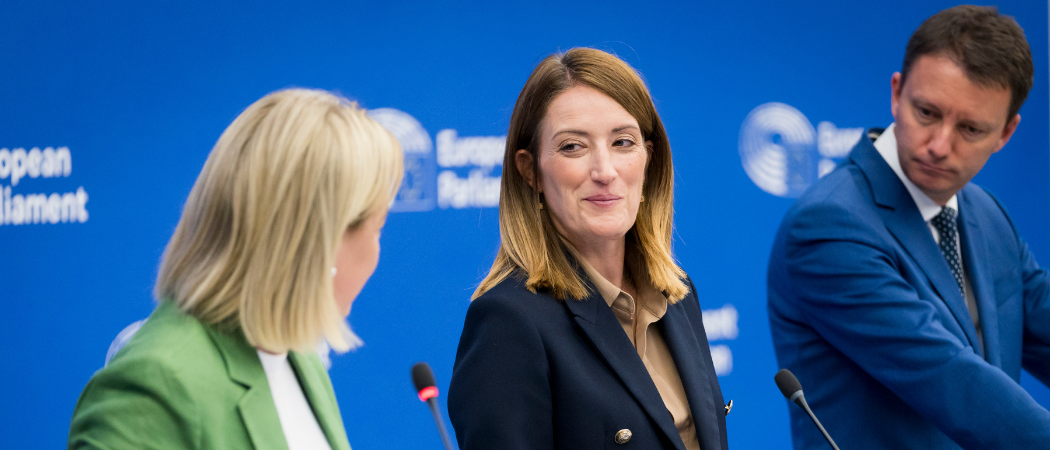MEPs vote for a long-term EU budget focused on competitiveness and defence, with an independent research Framework Programme

From left to right, MEP Carla Tavares, European Parliament president Roberta Metsola and MEP Siegfried Mureșan, speaking at a press conference. Photo credits: Daina Le Lardic / European Union
The European Parliament has adopted a report calling for a stronger EU budget capable of helping companies become more competitive within the single market. The non-binding document supports a standalone research Framework Programme in the next long-term EU budget and rejects the European Commission’s proposed Competitiveness Fund, which would merge several existing programmes.
The report on the next Multiannual Financial Framework (MFF) was approved during the Parliament’s plenary session in Strasbourg on May 7, passing with 317 votes in favour, 206 against, and 123 abstentions.
Although non-binding, the report outlines a vision for an MFF focused on defence and security, competitiveness and crisis preparedness.
These priorities draw on expert input, including the Draghi report, which calls for at least €750 billion to €800 billion in additional annual investment from 2025 to 2030 to enhance competitiveness, and the Niinistö report, which recommends allocating at least 20% of the overall EU budget to security and crisis preparedness.
The Parliament’s report also builds on European Commission president Ursula von der Leyen’s plans to invest €500 billion in defence investments over the next decade.
According to MEPs, the link between innovation and security is clear and essential for a stronger European Union.
More investment in the EU’s own defence will reduce the dependency on the US, said Dutch Renew MEP Anouk Van Brug during the debate on the report. But strengthening defence also requires innovation, she added: “We need to bet on our industry, because what we're doing today means that we can be leaders, technologically speaking, so that our jobs and our welfare state can be protected.”
Siegfried Mureșan of the European People’s Party, who co-authored the report in the budget committee, argued that economic strength is key to European security.
“People will only feel safe in Europe if our economy is strong. Companies will only invest if they feel protected. And we will only be able to invest more in security and defence if our economy is strong and competitive,” he said.
All programmes must contribute to making Europe more competitive, Mureșan went on. Simply renaming a merged set of programmes as a Competitiveness Fund does not automatically make the economy more competitive, he concluded.
A standalone FP10
The report recalls that, under the EU treaties, the Union is required to adopt a Framework Programme for research.
In a recent Science|Business interview, co-rapporteurs Mureşan and Carla Tavares (of the Socialists and Democrats Group) said the European Parliament backs a dedicated research programme in the new MFF and insists the proposed Competitiveness Fund must be a new instrument, not a merger of existing, successful programmes.
“We do not believe that merging all of the programmes [. . .] is the right solution. We do not feel researchers and farmers should be competing for the same funding,” Mureșan said in a press conference on May 7. “We are open, as we said, to merging programmes, but not everything into a single national plan.”
Related articles
- MEPs' vote reinforces push for a standalone FP10
- MEPs press budget committee to join the fight for FP10
- MEPs throw weight behind standalone FP10 with bigger budget
The Parliament recently took a firm stance on the independence of the next Framework programme, FP10, in a plenary vote on a report presented by the research and industry committee. According to this new report, FP10 should be granted a budget of at least €220 billion to be able to fund at least 75% of high-quality proposals. Last week, the Commission’s interim analysis of Horizon Europe showed that only 30% of high-quality proposals had been funded so far.
The approval of the budget committee report on the MFF now adds further momentum to that position, even if neither report is binding on the Commission or the EU Council.
The Commission is expected to present its MFF proposal in July, with negotiations with the Parliament and the Council likely to extend through autumn 2025 and to continue until the end of 2027.





 A unique international forum for public research organisations and companies to connect their external engagement with strategic interests around their R&D system.
A unique international forum for public research organisations and companies to connect their external engagement with strategic interests around their R&D system.